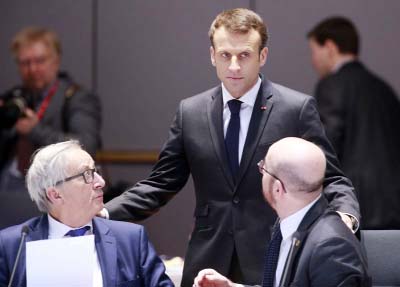
AP, Brussels :
Several European Union countries said Friday they may follow Britain in expelling Russian diplomats, as EU Council chief Donald Tusk predicted member states would introduce more measures against Moscow for the poisoning of an ex-spy in England.
At a summit in Brussels, the 28 EU leaders agreed with Britain that it is “highly likely” Russia is responsible for the March 4 attack on Sergei Skripal and his daughter, Yulia. They remain unconscious in critical condition after being exposed to a military-grade nerve agent.
The EU has recalled its ambassador from Moscow for consultations over an incident it called “a grave challenge to our shared security.”
French President Emmanuel Macron said the nerve-agent attack was an attack on Europe’s sovereignty that required a “coordinated and determined response.”
Tusk called the bloc’s response “unprecedented,” and said “more steps are expected at a national level” starting Monday.
“I am especially pleased that despite tough Brexit negotiations, the EU has demonstrated unanimous and unequivocal unity with the UK in the face of this attack,” Tusk said at a Brussels news conference.
He said it was too soon to say whether the bloc as a whole would take more action.
The strong solidarity from the EU – which Britain is due to leave next year – is a victory for British Prime Minister Theresa May’s efforts to muster international condemnation of a chemical weapons attack on British soil.
Macron and German Chancellor Angela Merkel both said the evidence presented by May at the EU summit was persuasive – comments echoed by Lithuanian President Dalia Grybauskaite
Britain and Russia have expelled 23 of each other’s diplomats since the attack, which has sparked an east-west diplomatic crisis reminiscent of the Cold War. Britain says the expelled Russians, who left London earlier this week, were undeclared intelligence agents.
Several minibuses left the British embassy in Moscow on Friday, reportedly carrying the expelled U.K. diplomats.
Rather than pressing the EU for new economic sanctions on Moscow, May is seeking to erode Russia’s extensive spy network by removing intelligence agents operating under diplomatic cover.
Latvian Foreign Minister Edgars Rinkevics said the Baltic nation might follow Britain’s lead and expel Russian diplomats who are judged to be spies next week, in coordination with other EU countries.
Neighboring Lithuania has said it also is considering expulsions. Czech Prime Minister Andrej Babis said it was “probable” that his country would also kick out Russian diplomats, noting that discussions were still ongoing.
Irish Prime Minister Leo Varadkar said Ireland would conduct a security assessment of Russian diplomats with a view to possibly expelling those who are not legitimate.
Danish Prime Minister Lars Lokke Rasmussen said his country would also consider “whether we should take unilateral steps.”
Several European Union countries said Friday they may follow Britain in expelling Russian diplomats, as EU Council chief Donald Tusk predicted member states would introduce more measures against Moscow for the poisoning of an ex-spy in England.
At a summit in Brussels, the 28 EU leaders agreed with Britain that it is “highly likely” Russia is responsible for the March 4 attack on Sergei Skripal and his daughter, Yulia. They remain unconscious in critical condition after being exposed to a military-grade nerve agent.
The EU has recalled its ambassador from Moscow for consultations over an incident it called “a grave challenge to our shared security.”
French President Emmanuel Macron said the nerve-agent attack was an attack on Europe’s sovereignty that required a “coordinated and determined response.”
Tusk called the bloc’s response “unprecedented,” and said “more steps are expected at a national level” starting Monday.
“I am especially pleased that despite tough Brexit negotiations, the EU has demonstrated unanimous and unequivocal unity with the UK in the face of this attack,” Tusk said at a Brussels news conference.
He said it was too soon to say whether the bloc as a whole would take more action.
The strong solidarity from the EU – which Britain is due to leave next year – is a victory for British Prime Minister Theresa May’s efforts to muster international condemnation of a chemical weapons attack on British soil.
Macron and German Chancellor Angela Merkel both said the evidence presented by May at the EU summit was persuasive – comments echoed by Lithuanian President Dalia Grybauskaite
Britain and Russia have expelled 23 of each other’s diplomats since the attack, which has sparked an east-west diplomatic crisis reminiscent of the Cold War. Britain says the expelled Russians, who left London earlier this week, were undeclared intelligence agents.
Several minibuses left the British embassy in Moscow on Friday, reportedly carrying the expelled U.K. diplomats.
Rather than pressing the EU for new economic sanctions on Moscow, May is seeking to erode Russia’s extensive spy network by removing intelligence agents operating under diplomatic cover.
Latvian Foreign Minister Edgars Rinkevics said the Baltic nation might follow Britain’s lead and expel Russian diplomats who are judged to be spies next week, in coordination with other EU countries.
Neighboring Lithuania has said it also is considering expulsions. Czech Prime Minister Andrej Babis said it was “probable” that his country would also kick out Russian diplomats, noting that discussions were still ongoing.
Irish Prime Minister Leo Varadkar said Ireland would conduct a security assessment of Russian diplomats with a view to possibly expelling those who are not legitimate.
Danish Prime Minister Lars Lokke Rasmussen said his country would also consider “whether we should take unilateral steps.”

